

Syn-lab.fr. Arvind Gupta. Richard Culatta. [Selected presentations after 2011 available on YouTube] Plenary Panel Member, mLearnCon June, 2011.
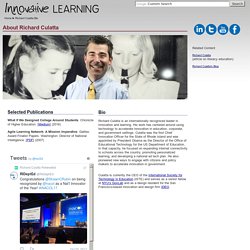
Blog - playDUcation. Basti Hirsch. Mitchel Resnick. L'ESPER. Jane McGonigal. Jane McGonigal (born October 21, 1977) is an American game designer and author who advocates the use of mobile and digital technology to channel positive attitudes and collaboration in a real world context.
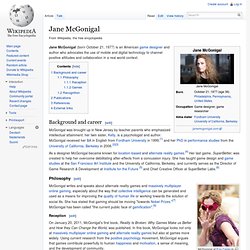
Background and career[edit] McGonigal was brought up in New Jersey by teacher parents who emphasized intellectual attainment; her twin sister, Kelly, is a psychologist and author. McGonigal received her BA in English from Fordham University in 1999,[1] and her PhD in performance studies from the University of California, Berkeley in 2006.[2][3] As a designer McGonigal became known for location-based and alternate reality games.[4] Her last game, SuperBetter, was created to help her overcome debilitating after-effects from a concussion injury. Philosophy[edit] Reception[edit] On January 20, 2011, McGonigal's first book, Reality Is Broken: Why Games Make us Better and How they Can Change the World, was published.
François Taddei. Kirsten Winkler. Simon Bachelier. Cheveux longs attachés, courte barbe, chemise rouge et pantalon noir, Simon Bachelier a une voix douce et accueillante.
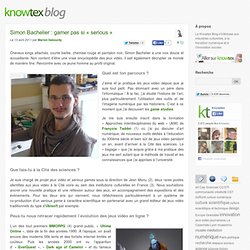
Non content d’être une vraie encyclopédie des jeux vidéo, il sait également décrypter ce monde de manière fine. Rencontre avec ce jeune homme au profil original. Quel est ton parcours ? Bret Victor. Bret Victor / April 11, 2011 The power to understand and predict the quantities of the world should not be restricted to those with a freakish knack for manipulating abstract symbols.
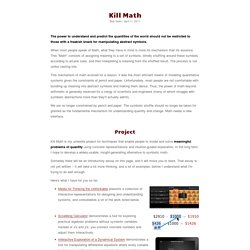
When most people speak of Math, what they have in mind is more its mechanism than its essence. This "Math" consists of assigning meaning to a set of symbols, blindly shuffling around these symbols according to arcane rules, and then interpreting a meaning from the shuffled result. The process is not unlike casting lots. This mechanism of math evolved for a reason: it was the most efficient means of modeling quantitative systems given the constraints of pencil and paper. We are no longer constrained by pencil and paper. Project Kill Math is my umbrella project for techniques that enable people to model and solve meaningful problems of quantity using concrete representations and intuition-guided exploration.
Someday there will be an introductory essay on this page, and it will move you to tears. Thieu Besselink. Posted on February 14, 2011 The Learning Lab is an independent studio and think tank founded by dr.
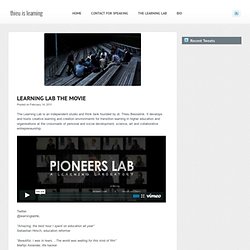
Thieu Besselink. It develops and hosts creative learning and creation environments for transition learning in higher education and organisations at the crossroads of personal and social development, science, art and collaborative entrepreneurship. Twitter @learninglabNL “Amazing, the best hour I spent on education all year” Sebastian Hirsch, education reformer “Beautiful, I was in tears. ..The world was waiting for this kind of film” Martijn Aslander, life hacker “The film had me at the edge of my seat. In 2010, a group of twenty Honors students enrolled in a course at the University of Amsterdam, with the vague description ‘The Learning Lab’. You can see the long or short version at Watch the MOVIE made by Victor van Doorn en Jochem Smit about The Learning Lab. Clara Victoria Colbert. Through the New School methodology, Vicky found a way to significantly expand and improve education in Colombia's rural multigrade schools.
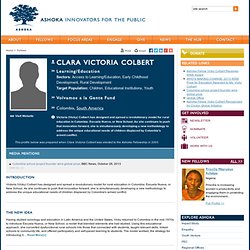
Now she is developing a new strategy to similarly reach Colombia's displaced children. Building on previous experiences like the Unitary School promoted by UNESCO in the 1960s and the Montessori School, Vicky led and introduced an innovation into Colombian rural education when she began the New School in 1975 with a pilot project of 150 schools. The New School's strategy is rooted in focusing on the student, including such aspects as active learning centered on student participation, a new role for the teacher as facilitator of cooperative learning, and interactive self-teaching texts and guides. It also introduced new elements into the curricula that are more applicable to the students' daily lives and families; such elements include mapping the area where they live and learning about the agricultural calendar.
Read less.